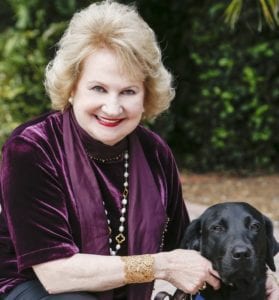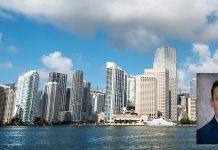
Virginia Jacko’s morning routine: She awakens at 5 a.m. — no need for an alarm clock; feeds her guide dog Eva and takes her out. On Tuesday and Thursday mornings, with the assistant of her guide dog, she heads to the gym in another building in her complex to work out for an hour.
Each morning she washes up, brushes her teeth, takes a shower and washes her hair. Nothing extraordinary so far. Then she blow dries her hair, uses the curling iron to set it and brushes it out. Make-up is put on flawlessly.
She eats breakfast, selects her outfit, knowing the difference between her denim jacket and Italian wool jacket, and matching shoes for the day— and out the door she goes. So again you ask, what is so unusual?
Well, Virginia has been totally blind for the past 15 years, and it hasn’t stopped her from doing anything a sighted person can do.
“I might be blind, but I have excellent vision,” she says. “It’s possible to ‘see’ without sight.”
Virginia doesn’t consider blindness a problem. In fact, she describes her condition often as an asset. She is never distracted by what’s going on around her, but can focus, using her other senses, which she says have taken over.
To function in a sighted world, Virginia didn’t bemoan her fate but realized that she simply had to learn to do things differently, which she did when she entered the Miami Lighthouse for the Blind and Visually Impaired’s transformational rehabilitation program in 2001.
One of the advantages that Virginia had was that she wasn’t blind at birth. Another was her inherent optimism, can-do spirit, and toughness, which she attributed to her early years. She was 14 years old when she held her first after-school and summer job where she wasn’t coddled but learned how to work hard. Kids today do not have these same work experiences at a young age, she said.
Her work ethic helped her achieve a successful career ultimately as senior financial advisor to the president and provost at Purdue University in Indiana when she experienced gradual vision loss. After several misdiagnoses, a doctor finally got it right and she was told she had retinitis pigmentosa and would eventually go blind. That’s when she found Miami Lighthouse, moved to Miami, and never looked back.
After vision rehabilitation at Miami Lighthouse, she worked as a volunteer, and with the skills she learned as a sighted person under her belt, she became a board director and treasurer. When her board colleagues saw her talents and were in need of a CEO, she was asked to serve as CEO pro bono until they completed a national search. They subsequently ask her for references and her resume, then called off the search and hired Virginia to the top position in 2005. Virginia is one of a handful of blind CEOs in the country.
In her job, thanks to modern technology that offers devices adapted for the blind, she is fluent in Word, Excel, Outlook and many other computer programs. She listens to her emails, responds to them, opens attachments, etc. In other words, she does anything a sighted person would do in that job.
When asked what she is most proud to have achieved during her tenure, she rattles off a list of impressive items. First, she says, clients have increased from fewer than 500 in 2004 to more than 15,000 today. The operating budget has increased fourfold and the Lighthouse has received eight consecutive four-star ratings from Charity Navigator, which places it in the top 2 percent of non-profits in the nation.
She launched a $10 million campaign which was completed in one year thanks to many outstanding people who donated funds — and, of course, her leadership
In addition, Virginia has implemented new innovative programs, many of them including sighted people.
“Blind people need to know how to fit into the sighted world,” she said.
It is something she wants to encourage.
In the new pre-K program 3- and 4-year-old blind children do activities with sighted children. When they play beep baseball everyone wears a blindfold to even the playing field. The innovative Blind Babies Program was recently named Program of the Year by the Children’s Trust at its Champions for Children Awards ceremony that honors leaders in child advocacy. Another inclusion class is the very successful music program where talented sighted and blind young adults study music history and theory, compose original pieces and perform together at community events.
Instead of sitting home by themselves, legally blind seniors are encouraged to come to the facility every day for activities like fitness classes, arts and crafts, music therapy and lunch. The Lions Club of Miami, the Florida Division of Blind Services and Miami-Dade County support this daily Seniors Health and Group Activities program.
Virginia is especially excited about recently breaking ground for the 72,000-square-foot Lighthouse Learning Center for Children that daily will serve youngsters from birth through 4 years old. The goal of the programs is to more easily transition blind and visually impaired students to community schools.
Then there is the Florida Heiken Children’s Vision Program that enables needy schoolchildren to get comprehensive eye examinations and prescription glasses free of charge — and the list of services goes on. Visit the website at <www.miamilighthouse.org>.
Virginia is well known and respected in the community. She participates in many events. One of her favorites was walking down the runway with her guide dog, Gibney, at the Pawpurrazzi gala that supports the Humane Society of Greater Miami. Virginia was nervous because the runway was narrow and she had just gotten, Gibney. But, no problem. She did the walk magnificently, just like she does everything else.
Established in 1931, the Lighthouse is Florida’s oldest and largest private agency to serve blind and visually impaired people of all ages. It will celebrate its 85th anniversary on Jan. 28, 2017 during a gala at the historic Biltmore Hotel in Coral Gables.
For information on the event call Cameron Sisser at 786-362-7515 or go online to <www.miamilighthouse.org>.






